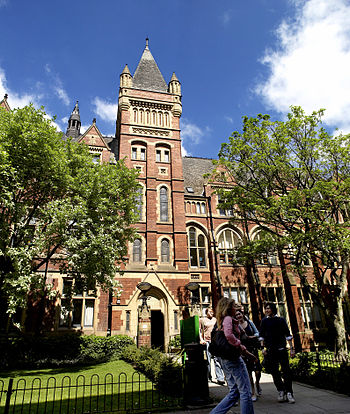 The University of Leeds is located in the city of Leeds, in northern England. The main buildings of the university were built in the second half of the 19th century. Its purpose was to develop scientific and technological education. In 1904 King Edward VII granted a royal charter to the University of Leeds.
The University of Leeds is located in the city of Leeds, in northern England. The main buildings of the university were built in the second half of the 19th century. Its purpose was to develop scientific and technological education. In 1904 King Edward VII granted a royal charter to the University of Leeds.
Introduction
The university’s roots can be traced back to the formation of the Leeds School of Medicine in 1831, and Yorkshire College of Science in 1847. In 1887, these two schools joined the Owens College of Manchester, Liverpool University College and Victoria University. It was granted a royal charter as an independent university by King Edward VII in 1904.
Curriculum
The University of Leeds is a heavyweight college. Excluding the University of London, the University of Leeds has the highest number of full-time students in the UK, providing more than 700 undergraduate disciplines and nearly 500 postgraduate disciplines. Leeds University has faculties of Arts, Biological Sciences, Business, Education, Social Sciences and Law, Engineering, Environment, Mathematics and Physical Sciences, Medicine and Health, Performance, Visual Arts and Communications.
Popular courses are Business Administration, Advertising and Marketing, International Marketing Management, Human Resources Management, Management, International Business, International Finance, Finance, Accounting and Finance, Economics and Finance, Communication Studies, International Communication, International News, Translation and Interpretation, Narration, Translation, English Literature, Drama, Psychology, Linguistics, History, Culture, Art, Law, Music, International Relations, International Politics, Economics, Sociology, Public Policies, English Language Teaching, Education, Special Education, Mathematics, Physics, Chemistry, Information, Computing, Multimedia, Design, Environment, Geology, Nanotechnology, Food Science, Biochemistry and Microbiology, Exercise Science, Biomedical , Transport Studies, Electronic Communications, Civil Engineering, Materials, Textiles, Aerospace, Mechanical Engineering, Automotive Engineering, Colour Chemistry, Medicine, Oral Surgery, Hospital Management, Public Health and Health Care.
Special Subjects
Classics, Philosophy, Religious Studies, Arabic and Middle Eastern Studies, East Asia Studies, French, German, Italian, Linguistic and Phonetics, Russian Studies, Spanish, Accounting and Finance, and Economics.
Library and Computer Resources
Leeds University library’s collection of books and periodicals total more than 250 million volumes, including the establishment of a full set of computer facilities with a CD system. The Brotherton Library is one of Britain’s four major research libraries. Besides this, the university has also established a large-scale computer network with more than 1,200 terminals, and each system has its own computing equipment. The Language Centre is equipped with the most advanced facilities. The centre also offers additional English courses.
Accommodation Service
The University of Leeds ensures accommodation can be arranged for every international student, but students need to contact the university in advance. The contact deadline for undergraduates is 1st June each year; for graduates it is 1st September each year.
Entry Requirements
University Foundation: High school graduates, over 18 years of age; IELTS 5.5 (5 points for Speaking and Writing) or a TOEFL score of 530.
Undergraduate: Completion of the first year of an undergraduate course in China or the matriculation to a UK undergraduate programme with an average score of 80% or above, IELTS 6.0 (5.5 points in Listening and Reading; 5 points in Writing and Speaking) or a TOEFL score of 550 points (TOEFL CBT 220 points).
Master’s: Holder of relevant professional bachelor’s degree; Average score of 80% or above, IELTS 6.5, TOEFL 550 points, simultaneous interpretation and some programmes need IELTS 7.0 or a TOEFL score of 580 points.
MBA: Graduate, the average score of 80% or above, 2 years relevant work experience, GMAT 600 points or above, IELTS 6.5 or a TOEFL score of 580 points (TOEFL CBT 220 points).
Tuition and Scholarships
Social Sciences or the Arts: £6,950 per year.
Natural Science courses: £9,225 per year.
Joint degree courses: £8,087 per year.
Medical courses: £17,735 per year
